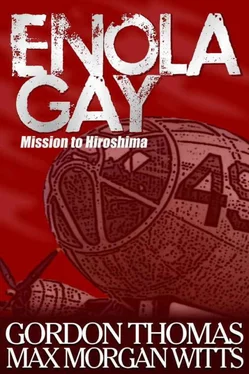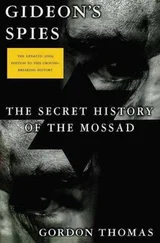Asada would always remember the mood of blind patriotism which had gripped the first meeting after Pearl Harbor at the Naval Club in Tokyo. There had been promises of generous funding for the atomic research. His caution about the vast technical problems to be overcome had been brushed aside. Those were the days when the Japanese appeared invincible. A naval officer had said that perhaps their new allies, the Germans, could help. Asada had pointed out that many of Germany’s leading atomic scientists were Jewish, and if they had not been expelled from the country, they were probably dead. Some, he added, might be in the United States. He had expressed the opinion that it was likely America had the potential to develop atomic weapons.
The naval officer had reprimanded him. “America—and Japan.”
For a year he and the other scientists involved had studied the question. In December 1942, they had presented their conclusions.
It would take them ten years to produce “some atomic weapons.” Even that was optimistic, as Japan did not have the essential raw uranium.
Project A was quietly shelved by the navy, although development work by the army on Japan’s atomic bomb would continue in a desultory fashion until well into 1945.
Project B was then initiated by the navy. Asada immediately recognized its potential. It was concerned with developing radar, navigation techniques, and the proximity fuze.
In the past eighteen months, astonishing progress had been made on all three. Two famous British warships—the Prince of Wales and the Repulse —had been of great help in the development of Japan’s radar. The ships had been sunk off Singapore in the high days of 1941. Japanese divers had located them on the seabed and performed the herculean feat of dismantling the radar apparatus from both ships. It had been shipped to Japan, reassembled, and provided invaluable information to research workers.
Asada himself had developed the proximity fuze. Soon it would go into full-scale production. His contribution on that aspect of Project B completed, he had joined a small and select band of scientists working on the most staggering of all weapons.
They were building a death ray.
It was a machine from the pages of science fiction. It was designed to project an invisible beam that would pluck an aircraft out of the sky either by shattering its propellers or killing its crew.
With such a weapon, Asada knew that Japan could snatch a stunning victory. No plane would be safe against the deadly ray. Carefully placed batteries of death rays could guarantee all Japanese cities immunity from air attack. Other batteries could be deployed against hostile craft approaching by sea. Later, the navy could have death rays mounted on its ships to destroy the enemy far away from the home islands.
The potential was heady and limitless. So far, a prototype had killed a laboratory rat. This modest success gave Asada hope. The next step Asada planned was to direct the death ray at a larger mammal.
Surprising the enemy was the abiding concern of Major General Seizo Arisue. Surprises were his business. He created them, spread them, anticipated them, and defused them.
He was head of Imperial Army Intelligence, Japan’s acknowledged spy master.
This bantam-sized man with a formidable intellect and a fearful temper to match his harsh, rasping voice kept a file on every important Japanese politician and officer. He knew more secrets than any man in the army, and often used them to maintain his own position.
In turn, the file on Arisue kept by his rivals in naval intelligence described him as “arrogant, supremely confident in his own abilities, and dangerously ambitious.”
The relationship between the two intelligence branches was icy. They were locked in a power struggle over which could provide the most valuable information.
Arisue was coming to believe that at last he might have the opportunity to resolve that issue with a striking espionage coup. He had been in his cramped office in a wing of the monolithic General Army Headquarters in Tokyo since early morning, trying to verify an intriguing report sent by his contact in Lisbon. Ordinarily, the report would not have reached Arisue personally. But he had given an explicit order that he must see “everything relating to America.”
Some of it came from the Abwehr in Berlin; there were outdated snippets from Madrid and Mexico City. The weekly summaries of the American press were more helpful. Army intelligence subscribed to 140 American newspapers and magazines. Very often The New York Times , the Saturday Evening Post, Collier’s, Time , and Newsweek contained clues of troop movements and battle casualties that helped Arisue piece together a surprisingly accurate mosaic of the United States at war. At first he had been suspicious of the material gleaned from the American press. He thought it might be a trap laid by enemy intelligence. But repeatedly he had been able to confirm independently the newspaper reports. He grew astonished at the American censors for allowing such important material to be published.
Now, as he studied the Lisbon report, he wondered what the Portuguese censors had made of it. No doubt they had passed copies on to British and American intelligence; in the past six months he had suspected this was happening regularly.
Arisue’s man in Lisbon had picked up a whisper that the United States had embarked on a huge new war project.
After hours of pondering, Arisue knew there was only one way to verify the truth of this claim. He must slip an agent into the United States.
That would be the most difficult operation he had yet mounted. No native Japanese could hope to remain undetected for long in North America. Arisue could call upon the flourishing German spy network in South America to provide an operative, but it might take months to clear matters through Berlin, especially as the tide was turning against Hitler. The Italians were already in disarray.
Arisue ruled out any help from the Axis.
He considered his own resources. His Lisbon contact was not qualified for such a dangerous mission. His men in Madrid and Mexico City were local recruits, capable of little more than acting as intelligence “post boxes.”
Brazil—he put a question mark next to the name of his agent there. He was a good man. But where would he begin?
The message from Lisbon had given no clue as to where the new American war project was being carried out, or what it was.
The problems were immense. But if he could discover what this new American war project was, it might be enough to stiffen the government’s resolve to fight on to the end.
Arisue sent for Lieutenant Colonel Kakuzo Oya, chief of the American Intelligence Section at Arisue’s headquarters. The two officers spent the rest of the afternoon discussing the prospects of infiltrating a spy into the United States.
Orders crackled over the B-29’s intercom. “We’ll do it by the book. They’re all gonna be watching. Nobody’s gonna screw it up. Right?”
The crew of the huge bomber didn’t respond to the pilot, Captain Robert Lewis. For the past hour they had been “doing it by the book,” strictly following the procedures laid down in the buff-colored manual. They had checked the outside of the bomber, clambered aboard, stowed their parachutes, and begun the pre-flight countdown.
Duzenbury, the engineer, and Caron, the tail gunner, who had flown with Lewis many times before, were surprised at how serious he was this crisp fall morning at Wendover. They knew Lewis as a joking twenty-six-year-old who wore a battered peaked cap and a stained flying jacket. He looked like a combat veteran, even though he had never seen action.
Читать дальше












